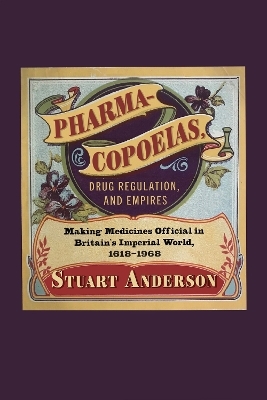
Pharmacopoeias, Drug Regulation, and Empires
Making Medicines Official in Britain’s Imperial World, 1618–1968
Seiten
2024
McGill-Queen's University Press (Verlag)
978-0-2280-2105-6 (ISBN)
McGill-Queen's University Press (Verlag)
978-0-2280-2105-6 (ISBN)
Pharmacopoeias – books describing approved standards and composition of drugs – have come in many shapes and forms throughout the history of medicine. Stuart Anderson traces the 350-year development of “official” pharmacopoeias across the British Empire, from the local to national scale, and later to a single pharmacopoeia across imperial Britain.
The word "pharmacopoeia" has come to have many meanings, although it is commonly understood to be a book describing approved compositions and standards for drugs. In 1813 the Royal College of Physicians of London considered a proposal to develop an imperial British pharmacopoeia – at a time when separate official pharmacopoeias existed for England, Scotland, and Ireland. A unified British pharmacopoeia was published in 1864, and by 1914 it was considered suitable for the whole Empire.
Pharmacopoeias, Drug Regulation, and Empires traces the 350-year development of officially sanctioned pharmacopoeias across the British Empire, first from local to national pharmacopoeias, and later to a standardized pharmacopoeia that would apply throughout Britain’s imperial world. The evolution of British pharmacopoeias and the professionalization of medicine saw developments including a transition from Galenic principles to germ theory, and a shift from plant-based to chemical medicines. While other colonial powers in Europe usually imposed metropolitan pharmacopoeias across their colonies, Britain consulted with practitioners throughout its Empire. As the scope of the pharmacopoeia widened, the process of agreeing upon drug standardization became more complex and fraught. A wide range of issues was exposed, from bioprospecting and the inclusion of indigenous medicines in pharmacopoeias, to adulteration and demands for the substitution of pharmacopoeial drugs with locally available ones.
Pharmacopoeias, Drug Regulation, and Empires uses the evolution of an imperial pharmacopoeia in Britain as a vehicle for exploring the hegemonic power of European colonial powers in the medical field, and the meaning of pharmacopoeia more broadly.
The word "pharmacopoeia" has come to have many meanings, although it is commonly understood to be a book describing approved compositions and standards for drugs. In 1813 the Royal College of Physicians of London considered a proposal to develop an imperial British pharmacopoeia – at a time when separate official pharmacopoeias existed for England, Scotland, and Ireland. A unified British pharmacopoeia was published in 1864, and by 1914 it was considered suitable for the whole Empire.
Pharmacopoeias, Drug Regulation, and Empires traces the 350-year development of officially sanctioned pharmacopoeias across the British Empire, first from local to national pharmacopoeias, and later to a standardized pharmacopoeia that would apply throughout Britain’s imperial world. The evolution of British pharmacopoeias and the professionalization of medicine saw developments including a transition from Galenic principles to germ theory, and a shift from plant-based to chemical medicines. While other colonial powers in Europe usually imposed metropolitan pharmacopoeias across their colonies, Britain consulted with practitioners throughout its Empire. As the scope of the pharmacopoeia widened, the process of agreeing upon drug standardization became more complex and fraught. A wide range of issues was exposed, from bioprospecting and the inclusion of indigenous medicines in pharmacopoeias, to adulteration and demands for the substitution of pharmacopoeial drugs with locally available ones.
Pharmacopoeias, Drug Regulation, and Empires uses the evolution of an imperial pharmacopoeia in Britain as a vehicle for exploring the hegemonic power of European colonial powers in the medical field, and the meaning of pharmacopoeia more broadly.
Stuart Anderson is emeritus professor of pharmacy history at the London School of Hygiene & Tropical Medicine.
| Erscheinungsdatum | 05.07.2024 |
|---|---|
| Reihe/Serie | Intoxicating Histories |
| Zusatzinfo | 12 photos, 12 tables |
| Verlagsort | Montreal |
| Sprache | englisch |
| Maße | 152 x 229 mm |
| Themenwelt | Geisteswissenschaften ► Geschichte ► Regional- / Ländergeschichte |
| Geschichte ► Teilgebiete der Geschichte ► Wirtschaftsgeschichte | |
| Studium ► Querschnittsbereiche ► Geschichte / Ethik der Medizin | |
| ISBN-10 | 0-2280-2105-7 / 0228021057 |
| ISBN-13 | 978-0-2280-2105-6 / 9780228021056 |
| Zustand | Neuware |
| Informationen gemäß Produktsicherheitsverordnung (GPSR) | |
| Haben Sie eine Frage zum Produkt? |
Mehr entdecken
aus dem Bereich
aus dem Bereich
Macht und Herrschaft im Zarenreich
Buch | Hardcover (2024)
C.H.Beck (Verlag)
49,90 €


